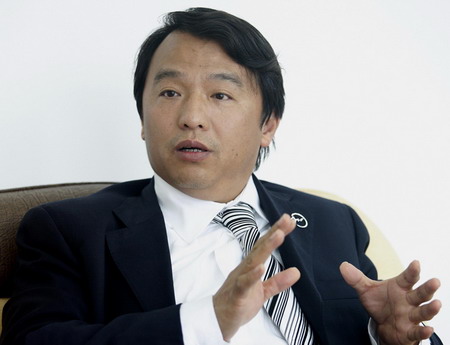Newsmaker
Fruits of a growing ambition
By Yu Tianyu (China Daily)
Updated: 2010-07-12 09:58
 |
Large Medium Small |
After several months of research, Yongye carried out its own marketing plan. "I asked a farmer how much he usually earned from one mu of farmland in a year. He said about 3,000 yuan," said Wu. "I immediately gave him 5,000 yuan as a deposit and asked him to try Shengmingsu for a year."
Wu was pleased with the smart marketing tactic but the reality disappointed him yet again.
When farmers find a good product that can help increase production, they are not willing to tell other farmers because they get concerned that more farmers using the product would accelerate market competition and influence crop prices, Wu explained.
As a result, the company held contests and rewarded those who shared the experience of using Shengmingsu and encouraged their neighbors and relatives to try it.
"We are delighted to witness that the farmers we used to talk to are now known as 'Boss Zhang' or 'Manager Li'," Wu said. "It actually echoed our Premier Wen Jiabao's promise earlier this year to enable Chinese farmers to live with confidence and dignity."
Working with farmers
Yan Shunli, a farmer from Tangshan, Hebei province, sprayed Shengmingsu on to his sweet melons. He found that the melons could be harvested up to five days earlier than previously.
Yan said the previous year's production of sweet melons from his three greenhouses was very small, and generated a total income of 30,000 yuan. In 2009, his yield was 7,000 kg of melons, which generated a total income of 50,000 yuan.
Despite being an area regularly hit by drought, Mingqin county in Gansu province saw unprecedented snow in the spring of 2008. The county has 47 greenhouses.
Pei Yuhua and five other households in Weiwu village used Shengmingsu on their peppers in six greenhouses. Plants in 40 of the 41 other greenhouses froze without any yield. Pei said: "Shengmingsu has an amazing ability to prevent plants from freezing, and most of the peppers survived from the natural disaster."
Wu Zishen says he can tell "millions" of such stories.
Wu moved his offices to farmland, holding meetings with his business partners and investors at farmers' homes.
"As an agricultural entrepreneur, an industry close to farmers, if you think you are not successful enough that's because you are not close enough to the farmers," Wu said.
In April, Wu gave a speech at Harvard University advocating "knowledge agriculture" and saying the business model of Yongye is not written in textbooks but found out on the farm.
"If you invest 40 yuan in one mu of land, I promise you can earn more than 400 yuan, but in reality it is likely to be 3,000 to 4,000 yuan; If you invest 100 to 200 yuan in a cow, I promise you can earn 2,000 yuan and it might exceed 10,000 yuan," Wu said.
Future development
Shengmingsu was used on 15 million mu of farmland across China in 2009, over 10 northern Chinese provinces, including the Xinjiang Uygur autonomous region.
China's rising incomes and increasing demand for grains and meat spurred the growth of Yongye's plant and animal nutrient business. The company's stores may rise to 20,000 by the end of 2010 after climbing to 13,000 from 1,100 early last year.
Since the beginning of 2010, Yongye has been streamlining the manufacturing process on the existing production line to enhance efficiency and output. The annual production capacity of the plant nutrient product has increased by 50 percent from 10,000 tons in 2009 to 15,000 tons.
Wu said: "We will promote Shengmingsu overseas when the production capacity reaches a certain level. We believe it will have a market since the pursuit of food safety, good taste and health is the same whether in China or abroad."
|
 |
|
Wu Zishen, chairman and CEO of Yongye International, describes himself as a son of the deserts. He says he is committed to seeking 'gold' in the barren lands for poor farmers. |
Curriculum vitae of Wu Zishen
From 1984 to 1988, official at the State Planning Department in Inner Mongolia autonomous region.
From 1989 to 2001, director to chairman at several State-owned conglomerates in the textiles, dairy and agriculture industries.
Since 2003, chief executive officer and chairman of the board of directors at Yongye International and its predecessor company, Yongye Biotechnology Co Ltd.
Since June 2009, founder of Media Veteran Environment-protection and Desertification Control Alliance, aiming to engage the media, businesses and the general public's awareness of and involvement in desertification control.



